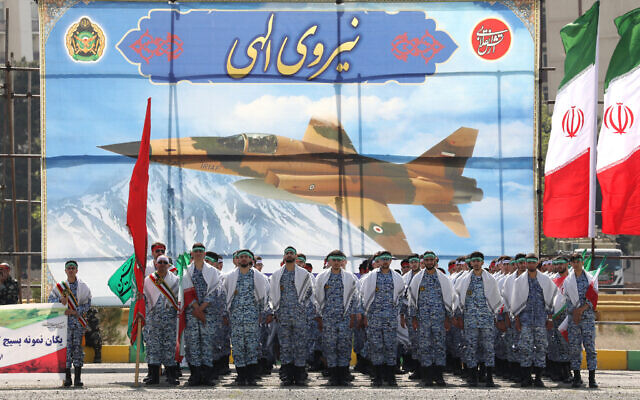Israel Reportedly Strikes in Iran, Days After Missile Attack
The reports at first seemed to indicate a major escalation in armed conflict between the two countries and raise fears of a broader regional war.

(JTA) — Five days after fending off a sweeping direct attack by Iran, Israel has struck back by bombing Iranian territory, according to several reports that cite an unnamed U.S. government source.
The exact site of the strike early Friday morning Iranian time is unknown but explosions were reported in the area of Isfahan, a city with a major air force base. Fox News and CNN, also citing unnamed U.S. sources, reported that the strikes were “limited” in scope and did not target Iran’s nuclear facilities.
The reports at first seemed to indicate a major escalation in armed conflict between the two countries and raise fears of a broader regional war. Before this week, Israel had battled with Iranian proxies but the two countries had never fired at each other directly.
But in the hours after the strike, a top Iranian official reportedly said he did not anticipate any retaliation by Iran, suggesting that efforts may be underway to cool tensions that have been ratcheting up for weeks.
A major escalation took place last weekend, when Iran fired hundreds of missiles and drones at Israel in response to an Israeli strike on Iranian military officials in Syria. Israel, together with a coalition of allies, shot down nearly all of the missiles and avoided fatalities in Israel.
Since then, Israel had indicated that it would retaliate directly against Iran despite warnings from the Biden administration not to do so. Now, Israel’s strike appears to have happened. Before the strike, Iran vowed to retaliate against any strike on its soil.
According to Israel’s Army Radio, there was a single strike in Isfahan but the Israeli attack seems to have concluded. Iran has closed much of its airspace.
“There was an attack, it ended an hour ago and since then it’s been relatively calm there,” correspondent Doron Kadosh said on Army Radio Friday morning Israel time. He added that in Israel, there was no change in instructions to civilians.
At least some in Israel had hoped for a more significant attack on Iran. “Lame,” Itamar Ben-Gvir, the far-right government official, tweeted after the strike.
Fears of regional conflict were already elevated following Hamas’ Oct. 7 attack on Israel. In addition to fighting Hamas in Gaza, Israel has been locked in a smaller-scale exchange of fire with the Lebanese terror group Hezbollah, an Iranian proxy.
Following the late-night attack on Israel last weekend, a statement from Iran’s mission to the United Nations said, “The matter can be deemed concluded” — but vowed a “considerably more severe” response if Israel committed “another mistake.” The statement also warned the United States to stay out of the conflict.
The United States led a multinational effort to defend Israel during the missile attack. But President Joe Biden reportedly warned Israeli Prime Minister Benjamin Netanyahu that the United States would not support or participate with an Israeli attack on Iran. A parade of world leaders visited Netanyahu in recent days to discourage an escalation, but Netanyahu insisted that Israel, not its allies, would determine its response to the missile attack.
Iranian state media reported on Thursday that the country’s military was prepared to respond forcefully to a new attack.
“The Zionist enemy’s nuclear facilities have been identified, and the Islamic Republic has accessed the necessary data on all targets,” a commander in the Iranian military told IRNA, a state network. “To respond to their possible action, we have fingers on the trigger to launch powerful missiles to destroy the identified targets.”



comments